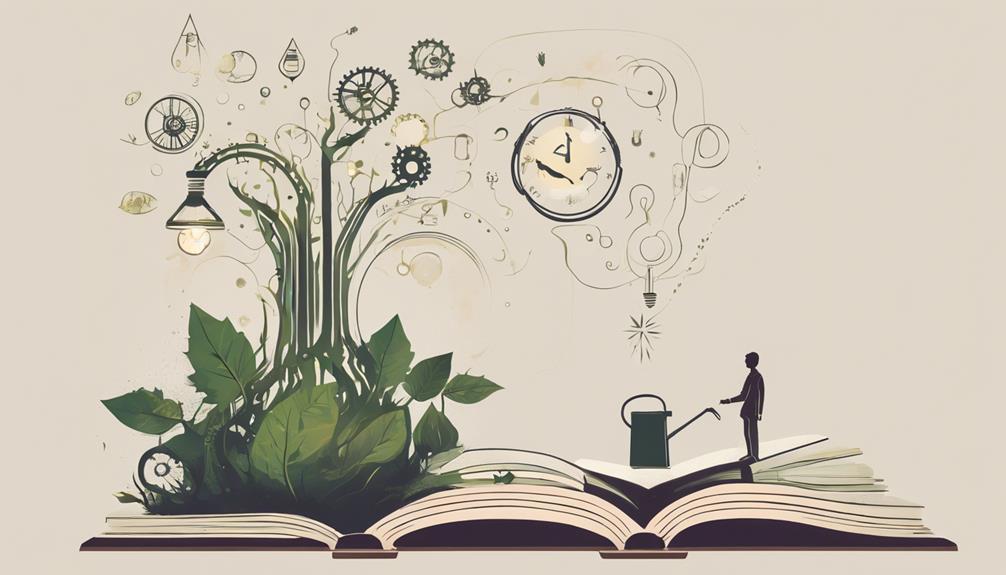Summary
- 1 Understanding the growth mindset
- 2 Facing the challenges
- 3 Learning from criticism
- 4 Celebrating effort and progress
- 5 Developing resilience
- 6 Frequently asked questions
- 6.1 How can I maintain a growth mindset in a highly competitive environment?
- 6.2 What is the role of self-compassion in fostering a growth mindset?
- 6.3 How can parents encourage a growth mindset in their children?
- 6.4 Are there apps or tools that can help develop a growth mindset?
- 6.5 How does a growth mindset affect career advancement and job satisfaction?
Empowering your full potential starts with a growth mindset. Believe you can improve your skills with effort and learning. See the challenges as opportunities To grow rather than obstacles. Embrace the feedback As a tool to enhance your abilities. Celebrate your progress, no matter how small, to stay motivated. Develops resilience Reacting positively to failures and adapting to difficulties. Break down complex tasks into manageable steps and reward yourself for each accomplishment. Keep pushing your limits and you will discover more tips and strategies that will help you flourish.
Understanding the growth mindset

By embracing the idea that your skills can grow with effort and learning, you will begin to understand what a growth mindset really means. A growth mindset is about believing that you can improve and develop your skills over time. It is the opposite of a fixed mindset, where people think their talents are fixed.
Think about learning to play an instrument. At first it might seem difficult and frustrating. But with practice, you get better, right? That's because you are willing to put in the effort and learn from your mistakes. This same principle applies to any skill or ability you want to develop.
When you have a growth mindset, you see setbacks as opportunities to learn, not failures. For example, if you didn't do well on a test, instead of thinking, "I'm not good at this," you would say, "I didn't study hard enough this time, but I can do better next time."
Facing the challenges
Facing challenges directly can be one of the most effective ways to cultivate a growth mindset. When faced with a difficult task, instead of backing down, dive in. Think of challenges as opportunities for growth. By facing them, you are not just solving a problem; you are expanding your capabilities and learning something new.
Take for example learning a new skill such as playing a musical instrument. It might seem difficult at first, but every time you practice, you get better. Every mistake is an opportunity to improve. Over time, you will notice progress, and that progress fuels your motivation to continue.
Another example is tackling a difficult project at work. Instead of feeling overwhelmed, break it down into more manageable steps. Each completed step increases your trust. Soon you will find that what seemed impossible is now within your grasp.
Learning from criticism

In facing challenges, it is equally essential to consider criticism as a valuable tool for growth. When someone offers you feedback, they are giving you. viewpoints that can help you to improve. Instead of viewing criticism as a personal attack, see them as an opportunity to learn.
Imagine learning to play the piano. If your teacher points out that your timing is wrong, he is not doing it to make you feel bad. He is trying to help you improve. By listening and adapting, you will be able to play more beautifully. The same principle applies to any area of life, whether it is work, hobbies or personal relationships.
Criticism can be difficult to accept, but it is often the boost you need to recognize The areas in which you can grow. Try to separate your personal value from your mistakes. Everyone makes some, and they are part of the learning process. When you receive feedback, ask yourself, 'How can this make me better?'
Celebrating effort and progress
It is important to recognize and celebrate the effort and progress you make along the way. When you take a moment to appreciate how far you have come, you increase your motivation and make the journey more enjoyable. Celebrating small victories can be simple but powerful. Here are some ways to do it:
- Set Intermediate Goals: Break down your big goals into smaller, more manageable tasks. Every time you complete one, pat yourself on the back.
- Reflect on Your Growth: Take time to look back from where you started and see the improvements you have made. Writing in a journal can help you track this progress.
- Reward: Pamper yourself when you reach a goal, no matter how small. It could be as simple as enjoying a favorite snack or taking a break to relax.
- Share with Others: Tell your friends or family about your achievements. Celebrating together can make your achievements even more meaningful.
Developing resilience

Sometimes, life's challenges may seem overwhelming, but developing the resilience helps you bounce back stronger. Resilience is your ability to bounce back from the kickbacks and to adapt to the difficult situations. Think of it as a muscle; the more you use it, the stronger it becomes. You can start building resilience by focusing on a few key strategies.
First, practice the compassion towards yourself. When things go wrong, it is easy to be hard on yourself. Instead, treat yourself with the same kindness you would offer a friend. Acknowledge your feelings without judgment and remember that everyone faces difficulties.
Next, set small goals and manageable. Break down big problems into smaller steps. For example, if you are having trouble with a work project, focus on completing one task at a time. This makes the challenges less overwhelming and gives you a sense of accomplishment with each step forward.
In addition, maintain a support network. Surround yourself with positive people who support and encourage you. Share your experiences and lean on them when you need them.
Frequently asked questions
How can I maintain a growth mindset in a highly competitive environment?
To maintain a growth mindset in a competitive environment, focus on learning and self-improvement rather than comparing yourself to others. Embrace challenges as opportunities for growth and seek feedback to understand areas where you can improve. Celebrate small victories to keep your motivation high. Remember, it's about progress, not perfection. Surround yourself with positive influences and remember that effort and perseverance lead to success. You can do it!
What is the role of self-compassion in fostering a growth mindset?
Self-compassion is key to fostering a growth mindset. When you are kind to yourself, especially after mistakes, you are more likely to see them as learning opportunities. Instead of punishing yourself, you will encourage yourself to try again. For example, if you did not get the job you wanted, remember that it is an opportunity to improve and grow. Being kind to yourself helps you stay motivated and resilient.
How can parents encourage a growth mindset in their children?
You can encourage a growth mindset in your children by praising their efforts, not just their successes. When they face challenges, remind them that it is normal to make mistakes and learn from them. Share your experiences in overcoming difficulties. Encourage them to try new things and persevere, even when it is difficult. Celebrate progress, no matter how small, and show them that learning is a lifelong journey.
Are there apps or tools that can help develop a growth mindset?
Wondering what apps or tools can help you develop a growth mindset? There are several great options! Try using apps like Headspace for mindfulness, which can help you change your perspective. Another good option is Khan Academy, which encourages learning from mistakes. You can also check out Mindset by Carol Dweck, which offers exercises and tips. These tools can make it easier and more engaging to cultivate a growth mindset.
How does a growth mindset affect career advancement and job satisfaction?
A growth mindset affects your career progress and job satisfaction by making you more open to learning and improvement. When you believe you can develop new skills, you are more likely to face challenges and adapt to changes in the workplace. This mindset helps you progress faster and feel more satisfied with your accomplishments. Embrace failures as learning opportunities and you will find your career blossoming and fulfilling.
